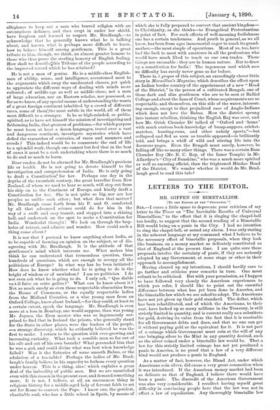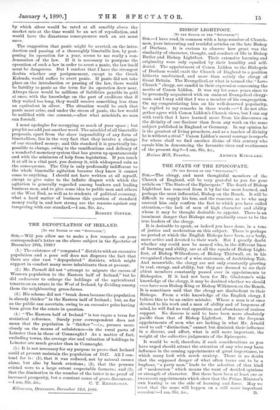LETTERS TO THE EDITOR.
MR. GIFFEN ON BIMETALLISM.
[To THE EDITOR OF THE " SPECTATOL1 Sra,—I crave a little space to deprecate. your criticism of my letter to the Times on " The Inevitable Results of Universal Bimetallism," to the effect that it is ringing the chapel-bell too loudly, to suggest that the second reading of a Bimetallic Bill would bring on a panic in the City. I had no intention to ring the chapel-bell, or sound any alarm. I was only stating in the soberest language at my command what I believe to be the necessary effect of bimetallic proposals, when they look like business, on a money market so delicately constituted as. that of England at the present time. I am quite sure these proposals involve the certainty of panic, if they are seriously adopted by any Government, at some stage or other in their- approach to accomplishment.
Having cleared up my intentions, I should hardly care to go farther and criticise your remarks in turn. One must submit to be criticised. But with your permission, as I happen to have followed very closely the American experiences to which you refer, I should like to point out the essential difference between what has yet been done in America, and the bimetallic law which we are asked to adopt. The Americans. have not yet given up their gold standard. The dollar, which has been rehabilitated, and of which the Americans, to their cost, have locked up so many millions in the Treasury, is still strictly limited in quantity, and is current really as a substitute for gold, deriving its value from the fact that it is receivable for all Government debts and dues, and that no one can get it without paying gold or the equivalent for it. It is not part of a coinage which Government must coin at the will of any one bringing silver to the Mint in any quantity desired, such as the silver coined under a bimetallic law would be. That a, law for this strictly limited coinage has not yet produced a panic in America, is no proof that a law of a very different kind would not produce a panic in England.
As a matter of fact, however, the Bland Act, under which Americans coin silver, did cause a very great commotion when it was introduced. If the American money market had been as delicate as that of England, I believe there would have been a panic. The discredit of the American Government was also very considerable. I recollect having myself great difficulty in convincing people here that the law was not in effect a law of repudiation. Any thoroughly bimetallic law by which silver would be rated at all sensibly above the market rate at the time would be an act of repudiation, and would have the disastrous consequences such an act must nave.
The suggestion that panic might be averted, on the intro- duction and passing of a thoroughly bimetallic law, by post- poning its operation for a year, seems to me really a con- demnation of the law. If it is necessary to postpone the operation of such a law in order to avert a panic, the law itself must be dangerous. But I confess that I have the strongest doubts whether any postponement, except to the Greek Kalends, would suffice to avert panic. If panic did not take place on the introduction or passing of the law, there would be liability to panic as the term for its operation drew near. Always there would be millions of liabilities payable in gold at once, with the knowledge on the part of creditors that if they waited too long, they would receive something less than an equivalent in silver. The situation would be such that panic must arise, and under the stress of panic, the law would be nullified with one consent, —after what mischiefs, no man can foretell.
I must apologise for occupying so much of your space ; but pray let me add just another word. The mischief of all bimetallic proposals, apart from the sheer impossibility of any form of bimetallism, lies in the very fact that they involve a change of our standard money; and this standard it is practically im- possible to change, owing to the ramifications and delicacy of a wonderful monetary system that has grown up spontaneously and with the minimum of help from legislation. If you touch it at all in a vital part, you destroy it, with widespread ruin as the consequence. The City is only profoundly indifferent to the whole bimetallic agitation because they know it cannot come to anything. I should not have written at all myself, except to give voice to the infinite disgust with which the agitation is generally regarded among bankers and leading business men, and to give some idea to public men and others at the West End, as well as to students of political economy, what a hard matter of business this question of standard money really is, and how strong are the reasons against any tampering with our standard.---I am, Sir, Ac., ROBERT GIFFEN.















































 Previous page
Previous page